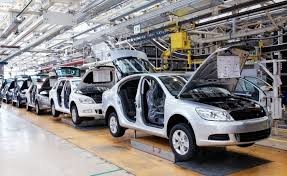 JELANI Aliyu, director general of the National Automotive Design and Development Council, NADDC, has described the MoU signed between Nigeria and Volkswagen as a major development in the growth of the Nigerian automotive industry.
JELANI Aliyu, director general of the National Automotive Design and Development Council, NADDC, has described the MoU signed between Nigeria and Volkswagen as a major development in the growth of the Nigerian automotive industry.
The MOU was signed on the sidelines of bilateral talks during the visit of German Chancellor Angela Merkel by Okechukwu Enelamah, minister of industry, trade and investment, on behalf of the federal government of Nigeria, and Thomas Schaefer, head of Volkswagen sub-Saharan Operations for the establishment of a car manufacturing plant in Nigeria.
By the terms of the MOU, Volkswagen, having identified Nigeria’s strong potential as an automotive manufacturing hub, undertakes to implement a phased approach in relation to the local manufacture of vehicles in Nigeria. In addition, Volkswagen intends to establish a training facility in partnership with the German government, and a Volkswagen vehicle service network Nigeria, subject to commercial viability.
On its part the federal government of Nigeria undertakes to ensure the passage of the Nigerian Automotive Policy, which is currently under consideration by the National Assembly, as well as ensure the creation and sustenance of a conducive environment for Volkswagen to invest and do business in Nigeria, in line with ongoing Ease of Doing Business reforms.
Enelamah said: “The MoU is a major step in our walk towards the development of a robust automotive industry to achieve its potential contribution to the continuous economic development of the country.
“We believe in the strategic and catalytic role of the automotive industry in the diversification of the Nigerian economy and we remain committed to encouraging and partnering with relevant stakeholders, especially investors and friends of Nigeria.”
”We will meet our commitments and look forward to welcoming other Original Equipment Manufacturers, OEMs, interested in working with us to increase local production, local procurement, and exports,” added Enelamah.
Also commenting, Aliyu said, “As Africa’s largest economy and most populous country, Nigeria offers not only a significant domestic market, but also the opportunity of a gateway to the West African market. We are pleased by the progress we have made in our engagement with Volkswagen, and excited to be partnering with a strong stakeholder with a full understanding of the huge potential Nigeria represents.”
Schaefer, head of Volkswagen’s sub-Saharan operations noted that Volkswagen “is serious about its intentions in sub-Saharan Africa”, adding that the region is “the last frontier for the automotive industry. Africa’s time is now and with good alignment between the African countries with automotive aspirations we can create intra-African trade and a win-win situation for all.”
Aliyu, explained that “The passage of the Automotive Policy will enable the creation of the necessary enabling environment for foreign direct investment and local production, by restricting the inflow of used vehicles into the country, and by providing the protective and fiscal incentives in support of local production, technology transfer and employment generation. This will help reverse thecurrent trend in which 400,000 used vehicles, worth an estimated $8 billion dollars, as well as millions of automotive related products, are imported into Nigeria annually, and will set Nigeria firmly on the path towards achieving a projected production and market absorption of 2 million new vehicles annually.”
Prior to this landmark signing of the MOU, a delegation of automotive investors, led by Schafer – who is also the president of the African Association of Automotive Manufacturers, AAAM, had visited Nigeria, in August 2016 and in July 2018, meeting with President Buhari, Vice President Osinbajo, members of the Economic Management Team, EMT, and the National Automotive Design and Development Council, NADDC.
To develop the nation’s automotive sector and revive local production, Nigeria launched an Automotive Policy in 2014, which is now being codified into legislation that is before the National Assembly. The Bill has passed the lower and upper chambers of the National Assembly, and is undergoing final legal procedures before proceeding for presidential assent.

